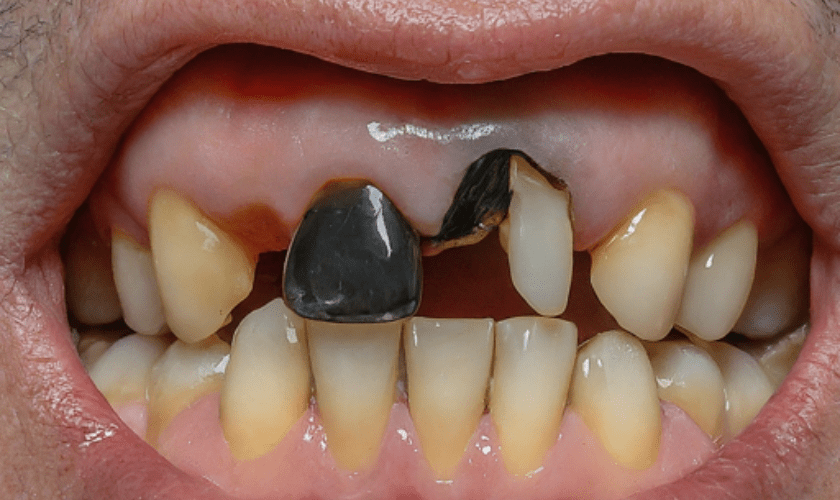What causes black teeth in adults? This common dental concern can result from a variety of factors, including poor oral hygiene, certain medications, and lifestyle habits such as smoking. Understanding these underlying causes is essential for addressing the issue effectively.
What Causes Black Teeth in Adults?
Poor oral hygiene practices are a significant factor when considering what causes black teeth in adults. Neglecting regular brushing and flossing can lead to the accumulation of plaque and tartar, which can eventually cause teeth to darken. Over time, this buildup can harbor bacteria that produce pigments, contributing to the discoloration of teeth. Additionally, failing to maintain proper oral hygiene can exacerbate existing dental issues, further leading to the darkening of teeth.
Inadequate oral care routines not only affect the appearance of teeth but also their overall health. When plaque is not removed effectively, it can harden into tartar, which is more challenging to eliminate and can lead to gum disease. This condition can cause gums to recede, exposing more of the tooth surface to potential staining agents. For more information on related dental discoloration issues, you can read about Sudden Brown Stains on Teeth Explained.
Tobacco Use and Smoking
Tobacco use and smoking are significant contributors to dental discoloration, often leading to the development of black teeth in adults. The nicotine and tar found in tobacco products can cause teeth to become stained over time, resulting in a darkened appearance. These substances not only adhere to the surface of the teeth but can also penetrate the enamel, making it difficult to remove the stains through regular oral hygiene practices. This discoloration is a common concern for many individuals who smoke or use tobacco products, as it can affect both the aesthetics and health of their teeth.
Understanding what causes black teeth in adults is crucial for those looking to maintain a healthy smile. The persistent exposure to tobacco smoke can exacerbate the staining process, leading to more pronounced discoloration. For those seeking solutions to improve their dental appearance, exploring options to Whiten Your Teeth in Bozeman may be a consideration for achieving a brighter smile.
Consumption of Dark Beverages
One of the factors that can contribute to what causes black teeth in adults is the consumption of dark beverages. Drinks such as coffee, tea, red wine, and cola are known for their rich pigmentation, which can lead to staining over time. These beverages contain chromogens, which are compounds that can adhere to the enamel of the teeth, resulting in discoloration. Regular consumption without proper oral hygiene can exacerbate this effect, leading to a noticeable darkening of the teeth. Understanding the impact of these beverages is essential when exploring the various causes behind black teeth in adults.
Certain Medication Side Effects
When exploring what causes black teeth in adults, it’s important to consider the side effects of certain medications. Some medications, particularly those containing iron or bismuth, can lead to discoloration of the teeth. This occurs because these substances can interact with the natural bacteria in the mouth, leading to a darkening effect on the tooth enamel. Additionally, long-term use of certain antibiotics and antihistamines has been associated with changes in tooth color. Understanding the potential impact of these medications on dental health is crucial for maintaining a bright smile. For more information on dental health, visit Stone Dental Lodge, your trusted Bozeman Dentist.
Dental Trauma or Injury
When exploring what causes black teeth in adults, dental trauma or injury is a significant factor to consider. An impact to the mouth, whether from an accident, sports injury, or any other form of trauma, can damage the blood vessels and nerves within a tooth. This damage may lead to internal bleeding or pulp necrosis, where the tooth’s inner tissue dies. Over time, this can cause the tooth to darken or turn black as the dead tissue and blood products accumulate within the tooth structure. Such discoloration is often a visible sign of underlying damage that has occurred due to the trauma.
Excessive Fluoride Exposure
One potential answer to the question of what causes black teeth in adults is excessive fluoride exposure. While fluoride is commonly known for its benefits in preventing tooth decay, overexposure can lead to a condition called dental fluorosis. This condition occurs when high levels of fluoride disrupt the normal development of tooth enamel, leading to discoloration and staining. In severe cases, the teeth may develop dark spots or streaks, contributing to a blackened appearance. This type of discoloration is often more prevalent in areas with naturally high fluoride levels in the water supply or where fluoride supplements are overused. Understanding the impact of excessive fluoride exposure is crucial when exploring what causes black teeth in adults.
Genetic Factors and Conditions
When exploring what causes black teeth in adults, it’s important to consider genetic factors and underlying health conditions. Some individuals may inherit genes that predispose them to dental discoloration, including the development of black teeth. Additionally, certain medical conditions can contribute to this issue. For instance, diseases that affect enamel formation or lead to excessive iron buildup in the body can result in teeth appearing darker or blackened. Understanding the role of genetics and health conditions can provide insight into why some adults experience this dental concern.
Aging and Natural Wear
As we age, our teeth undergo various changes that can contribute to discoloration, including the development of black teeth. One of the primary factors in what causes black teeth in adults is the natural wear and tear that occurs over time. The enamel, which is the hard outer layer of the teeth, gradually wears down, revealing the darker dentin beneath. This process can be exacerbated by years of exposure to staining substances such as coffee, tea, and tobacco. Additionally, the accumulation of plaque and tartar over the years can lead to a darkened appearance. While aging is a natural process, it plays a significant role in the transformation of tooth color, contributing to the phenomenon of black teeth in adults.
Dental Restorations and Fillings
When exploring what causes black teeth in adults, dental restorations and fillings can sometimes be a contributing factor. Over time, certain materials used in older dental restorations, such as amalgam fillings, may lead to discoloration of the surrounding tooth structure. This can result in a darkened or black appearance, particularly if the restoration begins to break down or if there is leakage around the filling. While modern dental materials are designed to minimize such issues, older restorations might still impact the color of teeth, contributing to the phenomenon of black teeth in adults.
Conclusion
Understanding what causes black teeth in adults is crucial for maintaining oral health. If you have concerns, call 615-542-5123 or read reviews on Google Maps.

